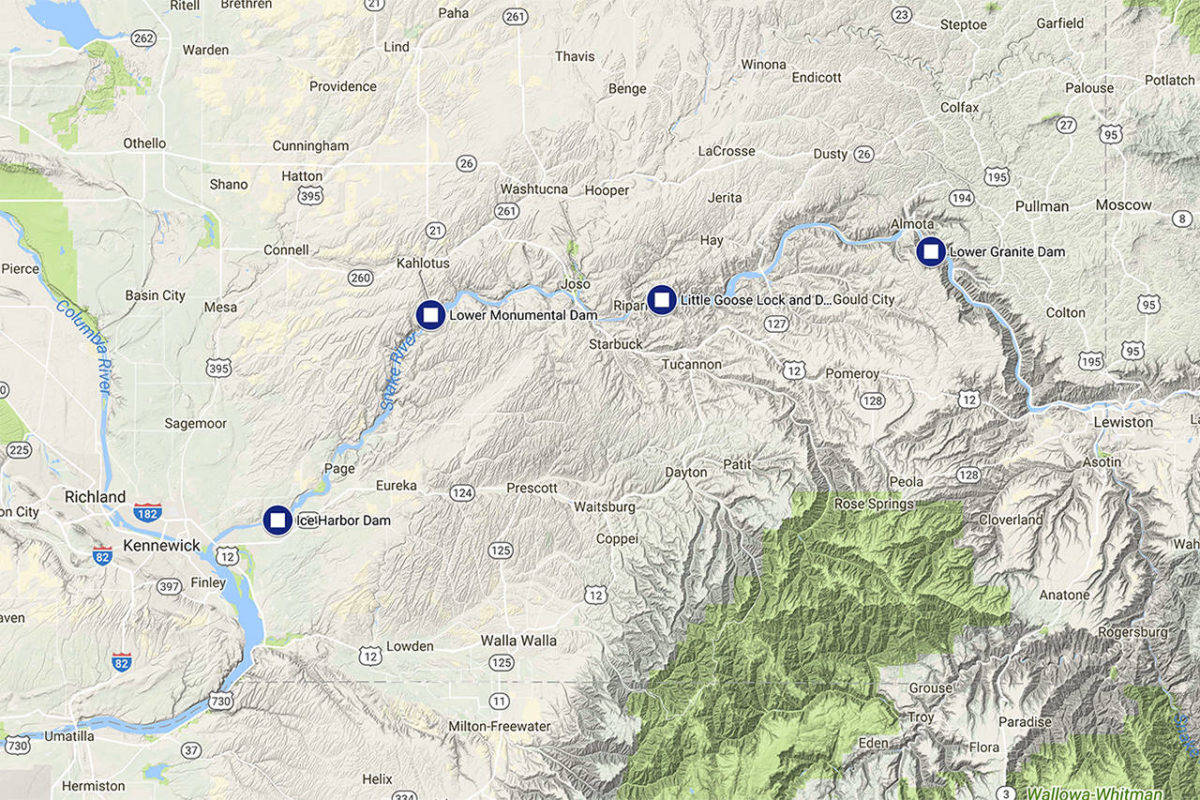While the region’s environmental groups work toward breaching the four lower Snake River dams to rehabilitate salmon runs, Orcas Power and Light Cooperative made a controversial decision to oppose the dam removals.
“It’s an issue in which there is no answer that solves all of the concerns. … The hydropower system as a whole is crucial to our community’s future,” OPALCO Board Member Mark Madson said. “We’re going to still be reliant on the mainland and the hydropower system for a huge portion of our energy.”
OPALCO’s stance on the topic of breaching the dams was questioned during its annual community budget meeting held on Orcas on Nov. 21.
According to orca advocates, the four lower Snake River dams are detrimental to the spawning of the Southern resident orcas’ primary food source — salmon. During its September meeting, OPALCO signed a resolution, “Supporting the federal Columbia River power system, recognizing its role in environmental stewardship, and opposing removal of the lower Snake River dams.”
“We believe we can build a successful future for our Orca whales, salmon, forage fish and wildlife, clean air and water, while keeping our power carbon free with the federal hydro system and all of the benefits it brings to the region,” OPALCO Board President Vince Dauciunas stated during the September adoption.
According to OPALCO, 50 percent of the energy produced in the Pacific Northwest comes from hydroelectric dams. Bonneville Power Administration — the region’s electricity provider — published a fact sheet in March 2016 that stated the four Snake River dams supplied 12 percent of the average energy production of the entire Federal Columbia River Power System and 5 percent of the Pacific Northwest’s power — energy to serve a city about the size of Seattle.
BPA provides power to Idaho, Oregon, Washington, western Montana and parts of eastern Montana, California, Nevada, Utah and Wyoming.
When discussing the removal of the four lower Snake River dams, a NW Energy Coalition report from March 2018 is frequently cited in arguments for the breaching, noting that 4 percent of Bonneville Power Administration comes from the four dams. The report concludes the dam removal would not negatively affect the region’s power generation.
“I’ll just go on record that report is just wrong,” Dauciunas said. He added that the data is incorrect, especially the assertion that there is no downside to taking these dams down, saying it is “wrong, wrong, wrong.”
Madson explained that the power generation number was determined prior to Washington state passing the Clean Energy Transformation Act in May 2019. This act requires the state to work toward 100 percent greenhouse gas-free electricity generation by 2045.
“As soon as that law passed and it became essentially legally impossible for us in the future for buying electricity from — not that we want to — from coal plants, from natural gas fire plants. The assumption was that [future] electricity was going to be coming from those sources rather than the hydropower system, it changed, it was invalidated overnight,” Madson said, adding that the hydro system instantly became one of the regions only stable, reliable power systems available. “So, we need to recalculate. Is the power from those dams actually required to meet the region’s needs? … Those assertions that the power from those dams is not required has been completely invalidated by the new law passed.”
Currently, the U.S. Army Corps of Engineers, U.S. Bureau of Reclamation and Bonneville Power are drafting an environmental impact study on the effects of the four hydroelectric dams and their potential removal. The final EIS is expected to be released next year.
Orca Network Board President Harold Garrett wrote a five-page letter to OPALCO regarding its decision. He had the following to say about the cooperative’s decision:
“It should also be noted that the agencies preparing this new EIS … receive $100s of Millions per year in federal appropriations to operate, maintain, and update the dams, and to mitigate for the harm to endangered species caused by the dams, and to research, write and publish the steady stream of failed Environmental Impact Statements, the last five of which have been rejected by US District Courts for the past 20 years for failing to protect endangered salmon and steelhead … These agencies on one hand are the beneficiaries of this annual massive federal taxpayer largesse based on the existence and operations of the dams, and on the other hand are tasked with determining whether keeping the dams is justified. The resolution serves their financial interests while killing the last native high-altitude salmon and [Southern] Resident orcas. … These are our human responses to experiencing such majestic, intelligent, and endearing beings making their living alongside us, including OPALCO’s members and customers. With this resolution OPALCO is participating in a widespread and historic subterfuge to protect four dams that provide only interminable debt and massive environmental destruction, including the starvation unto extinction of our precious Southern Resident Orcas. Please rescind this resolution.”
OPALCO is a member of the Washington Rural Electric Cooperative Association, which supports the retention of the lower four Snake River dams. The association requested all members to affirm this support as well, Board Member Jerry Whitfield explained. Whitfield also serves on the WRECA board and noted the other rural members tend to have more conservative views than OPALCO does.
Still, OPALCO General Manager Foster Hildreth encouraged the community to stay involved in their participation in the cooperative and to continue advocating for the Southern resident orcas.
“You are the advocates, we are the stewards. We’re responsible for making sure we have safe, reliable, affordable [electricity] and we want to look at all the best ways to make this work,” Hildreth said. “At the end of the day, … the change is not going to come just from [OPALCO], it’s going to come from the [people in the community who care]. You’re the change agents that will make it happen.”



